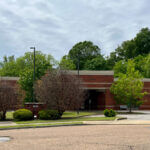Baptist center research proves incidental lung nodule program effective in early detection
JAMA-published research supports two-pronged screening approach
Memphis-based Baptist Cancer Center published a JAMA Network Open article proving the effectiveness of incidental lung nodule, or tumor, programs in detecting lung cancer early.
The cohort study, titled “Evaluation of Lung Cancer Risk Among Persons Undergoing Screening or Guideline-Concordant Monitoring of Lung Nodules in the Mississippi Delta,” compared the effectiveness of scheduled lung screenings against incidental diagnostic scans (taken during emergencies or other unrelated situations) in detecting cancer early. Dr. Raymond Osarogiagbon, chief scientist for Baptist Memorial Health Care/director of the Multidisciplinary Thoracic Oncology Program and the Thoracic Oncology Research Group for Baptist Cancer Center, was principal investigator of the study.

The research itself was gathered from all of the Baptist facilities as the lung nodule program is being implemented throughout the Baptist system, and the team that put the research together is based in Memphis.
“This is exciting news for the lung cancer community,” said Dr. Osarogiagbon. “This study establishes the importance of both incidental scans and scheduled screenings in detecting cancer early. Typically, a large number of people with incidentally detected lung nodules would not qualify for lung cancer screening under current eligibility guidelines. With this new dual approach, we can save more lives. ”
This cohort study, in which participants share a common characteristic, was conducted from Jan. 1, 2015, to Dec. 31, 2021, and included 6,684 participants in a low-dose computed tomography screening group and 12,645 participants in a lung nodule program. Those in the lung nodule program had significantly greater incidence of lung cancer diagnosis within two years. These findings suggest that lung nodule program participants, regardless of smoking history, had a substantial risk for lung cancer.
“One thing our research shows is that screening alone can only go so far in finding more lung cancers early, so it is important to have a complementary lung nodule program,” said Dr. Osarogiagbon. “Through this work, we are now primed to explore how artificial intelligence and biomarker research can improve the effectiveness of early lung cancer detection in Mid-South communities.”
The lung nodule program also provided access to early detection for a higher proportion of Black persons and those at greatest risk for lung cancer, such as the less educated, rural dwellers and the socioeconomically disadvantaged.
“We are so proud of our team of doctors, scientists and researchers for these leading-edge efforts to find new ways of diagnosing lung cancer early,” said Ann Bishop, system administrator of oncology for Baptist Cancer Center. “This research proves our methods are effective, and our efforts are unmatched in the fight against lung cancer and disparities.”
In 2021, Baptist Cancer Center announced a multifaceted initiative called the Mid-South Miracle aimed at reducing lung cancer deaths in the Mid-South by 25 percent by 2030. The initiative comprises seven components that will address prevention, diagnosis and treatment of lung cancer through smoking cessation, low-dose CT screening, algorithmic management of incidentally detected lung nodules, multidisciplinary decision-making and care, high-quality surgical care, high-quality pathologic evaluation, including biomarker testing, and expanded access to innovative treatment through clinical trials.
Baptist Memorial Health Care Foundation awarded a $1 million grant to Baptist Cancer Center in August 2020 to fund the incidental nodule research project.
To read the “Evaluation of Lung Cancer Risk Among Persons Undergoing Screening or Guideline-Concordant Monitoring of Lung Nodules in the Mississippi Delta” study in its entirety, please visit this link: https://bit.ly/3F88oYQ






